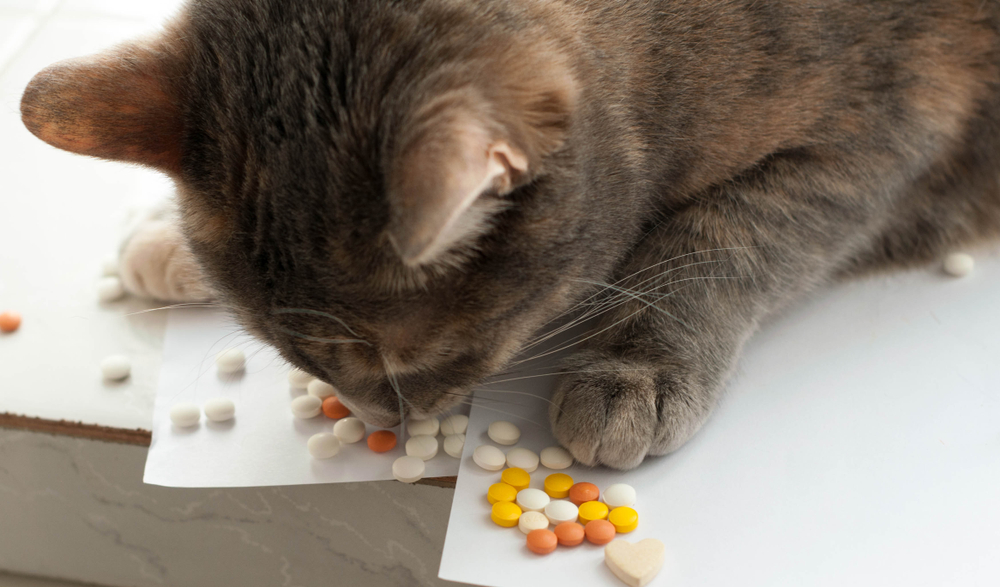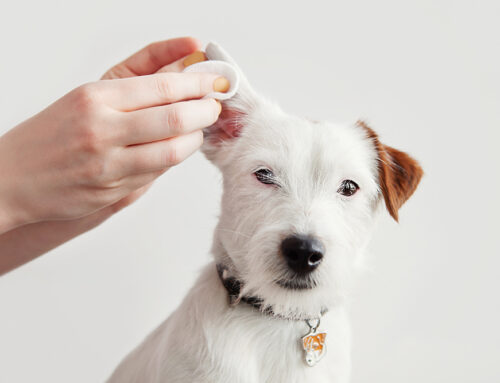March is Pet Poison Prevention Awareness Month, and our Memorial Villages Animal Hospital team is sharing important information about potential pet toxins in your home. By identifying common toxins and learning to recognize the signs an affected furry pal may show, you can take precautions to protect your pet and potentially save their life. Prevent your pet from ingesting these common toxins.
#1: Chocolate and pets
Every day, the American Society for the Prevention of Cruelty to Animals (ASPCA) Animal Poison Control Center receives hundreds of calls regarding pets who have ingested chocolate. While most pet owners know that chocolate is toxic for their furry pal and do not feed them the treat, curious pets still find a way to access this common sweet, which can have serious consequences. Chocolate contains methylxanthines—specifically, theobromine and caffeine—which are chemical compounds that create a stimulant effect on the nervous system and heart. In general, dark and bitter chocolates (e.g., cocoa powder, baking chocolate) contain higher methylxanthine levels than sweet or milk chocolates.
Chocolate toxicity affects each pet differently, according to their size and individual sensitivity. However, your pet’s chocolate toxicity can be serious enough to result in coma or death. Chocolate toxicity signs may take 6 to 12 hours to appear, and may include:
- Vomiting
- Diarrhea
- Increased thirst and urination
- Restlessness
- Fast heart rate
- Panting
- Muscle tremors
- Seizures
#2: Xylitol and pets
Xylitol (i.e., birch sugar) is a natural sugar alcohol originally derived from birch bark, and has many health benefits for people. Unfortunately, dogs are highly sensitive to xylitol, and if they ingest a food containing this ingredient, their pancreas releases a large amount of insulin, causing a severe blood sugar drop. Cats are less likely to experience xylitol’s toxic effects, most likely because they dislike sweets. Xylitol is an ingredient in many foods and products, including:
- Dental health products — Xylitol is commonly used in sugar-free chewing gums and mints, toothpastes, breath fresheners, and mouthwashes.
- Foods — This sugar substitute is also frequently used in powdered drink mixes, puddings, candies, chocolates, baked goods, syrups, ketchups, and barbecue sauces.
- Medications — Xylitol may be used in certain medications and vitamins, especially chewable or melt-away products.
- Personal care items — Other products that may contain xylitol include deodorants, sunscreens, lip balms, and makeup.
Try as you may, preventing your pet from getting into xylitol-containing foods and products is a huge challenge. Keep an eye out for these xylitol toxicity signs, which may include:
- Weakness
- Vomiting
- Depression
- Seizures
- Unresponsiveness
#3: Over-the-counter medications and pets
Many over-the-counter (OTC) medications are dangerous for pets, especially if administered at a dosage intended for people. While some products intended for people can be used safely, always consult your veterinarian before giving your pet any OTC medications, especially:
- Nonsteroidal anti-inflammatories drugs (NSAIDs) such as ibuprofen (e.g., Advil, Motrin) and naproxen (e.g., Aleve)
- Acetaminophen (e.g., Tylenol)
- Aspirin, kaopectate, and Pepto-Bismol
- Decongestants, such as pseudoephedrine
#4: Prescription medications and pets
Medications prescribed for people pose serious health risks for pets. According to the ASPCA Animal Poison Control Center, the following are the most commonly reported prescription medications that may cause serious pet poisonings:
- Anti-anxiety and antidepressant medications
- Heart and blood pressure medications
- Attention deficit disorder (ADD)/attention deficit hyperactivity disorder (ADHD) medications
- Sleep aids

#5: Veterinary prescription medications and pets
All medications—including prescription veterinary medications—are potentially hazardous for dogs and cats, especially if they ingest too much. Topical flea and tick preventives used incorrectly can also pose safety concerns. Prevent your pet from accessing these veterinary prescription medications:
- Flavored medications — The number one culprit for flavored medication overdose is Rimadyl, an NSAID made for dogs. Rimadyl is safe when used as directed, but has added flavoring that makes the chewable pill irresistible. Some dogs like the flavor so much, they steal and eat the entire bottle. Depending on the amount a dog eats, Rimadyl overdose can result in problems from a mild stomach upset to liver failure.
- Canine flea and tick products — The topical product permethrin is toxic to cats. Products formulated for dogs that contain permethrin are labeled with the warning, “Do not use on cats.” However, mistakes happen, and if you apply a product that containts permethrin to your cat, their toxicity signs can include twitching, tremors, drooling, and touch hypersensitivity.
#6: Household cleaners and pets
Bleach, rust removers, drain cleaners, detergents, and numerous other products are full of chemicals. Use products whose labels specify they are not toxic to pets. Avoid using cleaning products that have toxic ingredients or hazard warnings, such as danger, warning, and caution. If your household cleaners are not pet-safe, ventilate the area in which you are using them.
#7: Plants, flowers, and pets
Curious pets often treat a seemingly boring plant as a fun chew toy. However, particular plants and flowers can be toxic to pets. Depending on the plant, pets may react after consuming the leaves, sap, petals, or stems. Plant toxins can cause various reactions—from mild gastrointestinal (GI) distress to acute kidney failure. Dangerous plants include lily, azalea, cyclamen, daffodil, dieffenbachia, oleander, sago palm, hyacinth, tulip, and chrysanthemum.
To help your pet avoid toxins and other hazards, stay vigilant. New products—which may include ingredients that are harmful to pets—are always being introduced. If you suspect your pet has ingested a toxin, immediately contact our Memorial Villages Animal Hospital team or the animal poison control helpline.









Leave A Comment